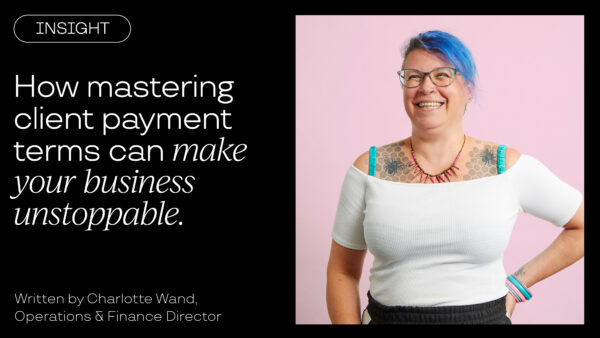
How Mastering Client Payment Terms Can Make Your Business Unstoppable

Written by Charlotte Wand, Operations & Finance Director
Welcome to my Spark guide on navigating client payment terms. Hopefully, there will be handy tips for everyone, from freelancers to SMEs and client finance departments. This may seem a little unusual, as Agencies are usually talking brand, strategy or creative – but behind the scenes sits the operations and finance and when this isn’t working properly, none of the exciting stuff can happen!
In the world of business, managing cash flow effectively is essential for success. One crucial aspect of this is understanding and optimising client payment terms. Whether you’re a freelancer, a small business owner, or part of a larger agency, striking the right balance between financial stability and client satisfaction is key.
In this post, I want to explore strategies for negotiating favourable payment terms, mitigating payment risks, and maintaining strong client relationships. I also shed light on the impact of unpaid invoices on small agencies and how to tackle them with grace and efficiency.
At the heart of every business transaction lies the agreement on payment terms. These terms can encompass everything from when payments are due to the methods of payment accepted and any penalties or incentives associated with them.
At Spark we make sure the terms are outlined in the Statement of Work, which is sent over to clients ahead of a project starting. Discussing financials openly, honestly and right at the start of a project means there shouldn’t be any difficult conversations once work has begun.
Recognising that every client is different is vital to us. Our terms are tailored to each client, there is never a one size fits all approach with us.
Negotiating payment terms can sometimes feel like a delicate dance, but it doesn’t have to be daunting. Here’s how we approach it at Spark:
Despite our best efforts, late payments can still occur. Here’s some methods on how to minimise their impact:
There are two other key considerations to help mitigate risk, but potentially not as simple to implement:
This is a biggie for Spark. We firmly believe the heart of everything we do is a strong client relationship.
We also understand that talking about money can be difficult, so we try to separate this from the Client Services team where possible, keeping the financial relationship between myself and the client accounts contact or team.
Here’s my quick guide on how to nurturing the relationship through effective payment management:
For small agencies, bad debt can pose significant challenges. It can cause so much damage that a client may not be aware of – and that’s before I even mention the time and resources spent chasing unpaid invoices and potential legal costs:
It may be slightly controversial for some agencies, but for Spark we request deposits ahead of work commencement with new clients. This is another step to help reduce non-payment risks and ensure a commitment from the client.
My top tips for handling deposits professionally and transparently are:
Talking about finances isn’t everyone’s cup of tea, but keeping it open, honest and upfront, you can position your agency for long-term success.
Remember, maintaining a balance between professionalism and friendliness can go a long way in building trust and loyalty with your clients. Here’s to building financial health and strong partnerships together!